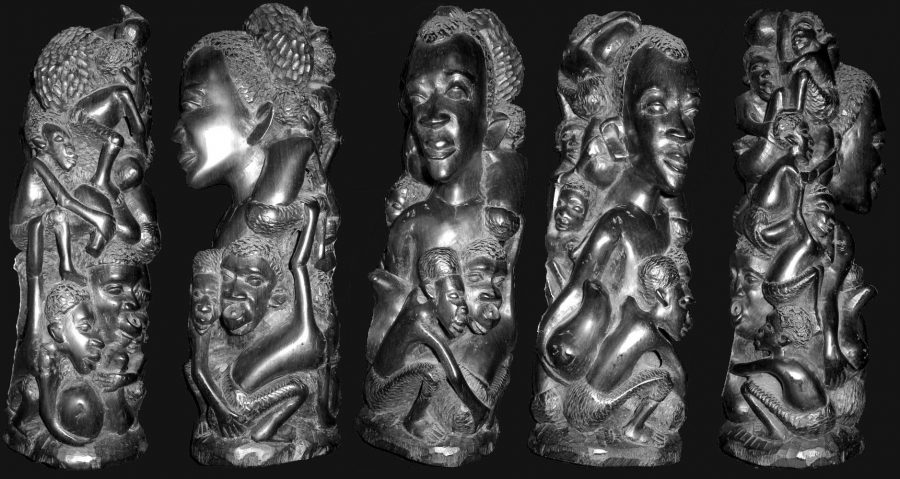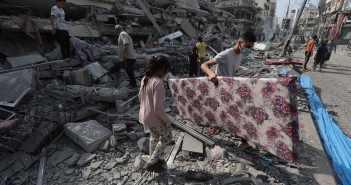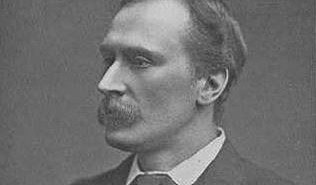The shop sign was in a Youghal side street, and it said Afro Crafts and Groceries. The right half of the window displayed cooking oil, tinned spices, bottled sauces and small bags of beans and lentils. On the left, a selection of small paintings of village and river fishing scenes, were cramped by colourful patchwork, miniature handcarved drums, wooden masks, animals and human figures. The carving of a village woman carrying a water jug on her head jolted Hal’s memory. Dark as the one his Dad had kept on the mantelpiece.
“Let’s come back here tomorrow, after a day at the beach,” Hal suggested to Jeanette. During the drive to the caravan they’d rented in Ardmore, though it was thirty years ago, Hal told her about his father’s stint as a volunteer agriculturist in Tanzania.
The following day, after a swim and a stroll, Jeanette ambled off on her own. The Afro Crafts and Groceries was open and empty, in the after dinner shade. Among the groceries were Barry’s Tea, tins of sardines and processed peas. Packets marked Siucra, shared shelves alongside cane sugar from Mauritius. Bags of maize meal, couscous and soya beans proclaimed the shop’s African dimension, and even more so the display of wrapped frozen cuts of goat, oxtail and whole bream in the display freezer. Hal selected a plastic jar of mild Caribbean curry, and a small tin of Kenyan pineapples; souvenirs that would not go astray in his Cork kitchen cupboard.
Placing the items on the counter beside the cash register, he headed over to browse the alcove laden with crafts.
First he flipped through a colourful bundle of batiks decorated with a motif of women and men at work, and wild animals. The wood carvings showed skill, but some of the masks erred on the side of kitsch.
Stretching deeper into the window, he lifted out the black ebony carving of a woman balancing a water jug on her head.
“From south-central Tanzania, Bwana. She is taking water from the river to her hut in the village.” The African shopkeeper now appeared quietly at Hal’s side.
“Made from a single piece of timber?” asked Hal, turning the figure he held upside down, and fingering the varnished grain of the heavy base.
“From a tree trunk. They first cut the local forest trees and chop the branches for firewood with pangas.”
“And the trunks?”
“Two men sawed these tree trunks. Kazi kweli – lots of work, we say in Kiswahili. But the carvers pay them, some local, some in other places of Tanzania, such as Kondowe.” The shopkeeper smiled faintly after his burst of English fluency. “You want other carvings? Some more I have in boxes behind.” nodding towards an open rear door.
“This woman with the water pot interests me.”
A holidaymaker entered the shop and began browsing around, which brought the African shopkeeper back to his cash desk.
Hal recalled snatches of conversation with his father. Peter Sheridan hadn’t opened up often about his East Africa days. He and a young British volunteer had driven around in a 4-wheel drive Toyota pickup. If they didn’t have bundles of timber, pipes or cement in the back, they took on casual passengers: pedestrians flagged them down, on the way to Kilosa or on the potholed dirt roads to distant Dar-es-Salaam. The isolated town itself, offered limited craic.
“My late father did agricultural work in Tanzania in the late sixties, helping small farmers with livestock and growing food.“ Explained Hal, approaching the cash register once the only other customer had left.
“Kazi ya maendeleo – development work, as we say.“ The African’s eyes brightened as he extended his hand. Hal grasped it. “There were some young wageni – foreigners- in the town near our village. They worked for the British company.”
“Voluntary Service Overseas: VSO. They recruited from Ireland too,“ Hal elaborated. He raised the wood carving still in his left hand. “He brought back something like this from a place called Tar… Tarande, I think.“
“You mean Tarandawe? Kweli kabisa!“ Dropping any semblence of formality, the shopkeeper stared Hal in the face.
“Tarandawe, as you say. Some hours drive south of Kilosa, beside a tributary of the Rufiji river. He said there were elephants in a forest upriver.“
The African’s demeanour changed from surprise to certainty. “The Mindenzi is a small river near our village and passes through the forest into Rufiji. The men hunt small animals there but that government does not allow to kill the elephant.“
“Any more carvings like this?“ Hal stood the pot-carrier on the counter, beside the tinned pineapple and plastic curry jar.
“You must ask Margarethe. She stays at the hostel for asylum seekers. Her friend sends boxes from Tanzania. Her village was in the district where the VSO company put down water pipes for the shambas – small farms.“
“You’re both from the same area? Did you know each other before coming to Europe?“ Assuming they were asylum seekers, Hal kept the questions general. No need to pry.
“I have a Portuguese wife, and passport of Portugal. Margarethe and myself, we were strangers, but many from Tarandawe went down to Cabora Bassa to build a big dam for electricity on Zambesi River in Mozambique. Few escudos and hard work. Margarethe’s mother cooked posho for the workers and the little girl just played with other children.“
“Did Margarethe’s father work on the dam?“
The African hesitated. “She never knew her father. Her mother was… alone. I became like her uncle. We could sometimes collect firewood, but the Portuguese soldiers supervised. We feared their rifles. Soldiers shot freedom fighters in the forest.“
Hal paid for his goods and asked the whereabouts of the asylum hotel. At the Cork end of town, it was a B & B cobbled together by the amalgamation of two adjoining houses. In a grassy front garden, he spied two rustic benches and a garden table. An Asian child peddled a plastic tricycle around a mother, absorbed in her embroidery, on the patio.
A girl helping in the kitchen told Hal that Margarethe was away visiting friends in Cork, so he took the telephone number and walked back to meet Jeanette near the old clock gate on main street.
During Sunday lunch with his mother and younger sister at the family home, Hal mentioned the Afro shop coincidence. Had Dad mentioned much about Tarandawe village? His mother denied that his talk had been anything but technical: damaged irrigation pipes, difficult road conditions, and the odd reference to wildlife and vegetation.
“The volunteers found Tarandawe a lonesome spot. Drinking weekends in one or two decrepit bars and dancing freestyle on the bar floor with anyone around to the accompaniment of scratchy Congolese rumba music. The music got weird whenever batteries ran down. No electricity, so tilley lamps and candles lit up the gloomy nights.“
“The one luxury he brought to Africa was his shortwave radio. Listened to it a lot in the dark evenings.“ Hal was happy to add one of the few details his dad had told him as a child. “Must have used up a lot of those batteries, too. Social life must have been pretty zero for young white fellows?“ Hal mused.
“That’s why VSO field officers came their way twice a year in a Land Rover, bringing tinned food, wine and old newspapers. Volunteers had an annual expenses-paid get-together in Dar, and bunked down at each others’ houses during holidays.“ Hal’s mother shuffled in her armchair. “Your Dad did his development bit, saw a few sights, and came back. Then he met me at a co-op dance in Mitchelstown.“
As his mother flipped through a Sunday supplement, Hal fetched the old photo album and pored over the ageing black and white snapshots of people. His father and an English mate posed with them. There were photos of working farmers and a longshot outside Kanjenje Bar in the village, looking like something out of a wild west film, except for the tropical flowers and palms. Among holiday snaps in faraway Dar es Salaam, there was one of his dad with two African men beside the bar entrance. Another was a closeup of his father standing at the same spot, next to a young village woman in a patterned headscarf.
A couple of weeks later, Hal phoned the Youghal hostel and asked for Margarethe. “Miss Sichalisi hasn’t returned from the Afro grocery yet. She helps out there unofficially, until the Dublin officials decide on her application. When he inquired if she would be at the shop on the following Saturday, The response was, “Probably.“
On a dry morning in Youghal, Hal parked his car, then strolled to the shop. The African man was again at the cash register, and introduced a fair-skinned woman who looked to be in her forties. “My wife Francesca,“ he said, after shaking hands. “We first met in Cabora, before she fled back to Tarandawe, after freedom fighters started moving against Portuguese soldiers. We got married and flew to Lisboa. But now we are trying for a new life, in Youghal.“
“My contacts in Lisbon and Maputo send us the foodstuffs, and also some crafts. Margarethe gets the wood carvings through associates in Dar. Come into the back room and meet her.“ Explained Francesca before she led Hal into a storeroom with wall shelves and boxes.
“Odi. Margarethe,“ Francesca called.
A woman, wearing a short sleeved red chemise over smart white slacks, entered through the doorway from a kitchenette. She had to be in her late twenties, just a few years junior to Hal. Her fawn colored curls complemented a caramel complexion, interrupted by patches of paler pigmentation. Not nearly as dark as her older African “uncle,“ Magarethe extended her hand as Francesca introduced, “Mr. Hal is from Cork city. He likes the Tarandawe wood carvings.“
“I have to be in the shop, so you can show Mr. Hal the new stock from Dar,“ suggested Francesca, before she left them alone.
Margarethe unloaded several carved objects from a packing case, for Hal’s inspection.
He picked up a carving of a woman with a water pot on her head. “My father told me that many villages in Tanzania have no piped water.“
Her eyes were on the carving as Margarethe answered, “African women have walked to rivers and water holes for thousands of years. Our village was near the river. The women got water and washed clothes at the river bank.“
“Was it the Mindenzi River?“ asked Hal, eager to show an informed interest.
At this, Margarethe’s polite reserve dissolved, and eyes sparkling, she placed the bust of a bearded old man on the table. “Mindenzi. You know it? No, it was a smaller river that soon joined Mindenzi. A British aid company brought pipes. Our villagers dug trenches. My mother helped, and so my grandparents had water for the kitchen. But still the women go to the river to wash clothes.“
“Your uncle mentioned the Mindenzi, last time I was here. He says it flows through Tarande.“ Hal knew he was once more mispronouncing the name of the place.
“Tarandawe“ corrected Margarethe, “is the market village of the district. The foreign workers lived there.“
“My late father, Peter…Peter Sheridan, worked for VSO… the British aid group, in Tarandawe. It was about thirty years ago. Perhaps he helped your mother and others to lay those water pipes.“ Hal was looking directly at Margarethe now. Her left hand went up to her cheek, before it covered her mouth in an attempt to conceal the soft sigh she emitted. Dabbing under her eyelids, she excused herself, producing a paper tissue from her handbag. Once composed, she looked at Hal. “My mother took me, as a child, to Cabora Bassa. She cooked for the workers. My friend, now Uncle Josam, was there. Sometimes we returned to our village for holidays. You are Hal… Sheridan?“
Hal nodded.
“Then you are the son of Bwana Peter, the white boy that drove the Toyota truck?“
“My father Peter worked in Tanzania after graduation. Yes, Peter Sheridan – he died of cancer in 1998. He was a volunteer in Tarandawe. After a two-year stint he came back to Cork.“
“My mother, she passed away, so I came to Europe with the help of Josam and Francesca. I think I am now home – if the Dublin office gives me a residence permit. With God’s help, here is my home.“
Hal selected two carvings of water pot women, and another of a giraffe.
“I’d like to come here again with my fiancé, Jeanette. We could take you to a restaurant. I’m curious to know more about Tarandawe and my father’s time there.“
Hal paid Francesca at the cash desk. As he turned towards the exit, Margarethe offered him a business card.
“I am sure we will meet often.“ She smiled as Hal stuffed the card unread into his shirt pocket. She followed him out and extended her hand in farewell. “You are welcome here always, Hal. Always,“ she said, sounding almost like a sister.
Back in the Cork flat, Hal put the carvings on his mantelpiece. Sipping lager from a stem glass, he withdrew the business card from his shirt pocket. At the left edge, he saw a silhouette of a palm tree, with Afro Crafts & Groceries prominently centered in green capital letters. Underneath appeared the rubric Manager: Francesca da Silva. In smaller print, at the bottom of the card, Hal read a second rubric – Craft Sales Agent: Margarethe Sichalisi-Sheridan.
Garreth Byrne worked in schools and promoted agriculture in East & Central Africa, and later taught English in China. He now lives in Leitrim and has no African progeny to declare.




